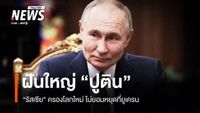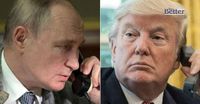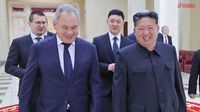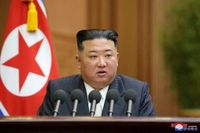In a significant diplomatic exchange, Kim Jong Un reaffirmed North Korea's unwavering support for Russia in its ongoing conflict with Ukraine during a meeting in Pyongyang on March 21, 2025, with Sergey Shoigu, the Secretary of the Russian Security Council. This meeting underscores the growing ties between North Korea and Russia amidst rising tensions globally.
Kim’s declaration came as the United States, led by President Donald Trump, pushed for an immediate ceasefire between Russia and Ukraine, aiming for a 30-day halt in hostilities. Reports suggest that while initial conversations included agreements on pausing attacks on each other's energy infrastructure, skepticism remains among both Ukrainian and Western leaders about Russia’s intentions.
Putin, expressing his concerns in a 90-minute call with Trump, stressed that substantial military aid to Ukraine from Western nations must cease for a full ceasefire to occur. This statement reflects a deep-seated apprehension within Russia regarding its military support's impact on its broader ambitions in the region. Simultaneously, Ukraine’s President Volodymyr Zelensky has indicated a need for more concrete assurances and details from the United States regarding the proposed ceasefire agreement.
The meeting between Kim and Shoigu was described as a reaffirmation of North Korea's commitment to support Russia in what they view as a battle to protect sovereignty and territorial integrity against Western interference. In the face of joint military exercises between South Korea and the United States dubbed 'Freedom Shield,' Kim underscored the necessity of collaboration between the two nations to navigate these precarious security dynamics.
During his sit-down with Shoigu, Kim articulated that North Korea remains dedicated to supporting Russia's military objectives. The discussions included a focus on enhancing cooperation in various fields, vital given the shifting geopolitical landscape. This meeting comes at a calculation that refines the fragile relationships between Korea and its neighbors amidst the ongoing strife in Ukraine.
Analysts have indicated that this strengthening of ties emphasizes the ongoing support from North Korea for Russia's efforts in Ukraine, a stance that is inconsistent with the calls for peace from the United States. Conversely, Trump’s administration, while eager to negotiate peace and establish clearer ties with Russia, faces significant pushback from Ukraine and its allies, particularly given Russia's historical denial of peace propositions.
Putin has historically placed a priority on re-establishing Russia’s influence over Ukraine, claiming that the country should not hold the status of a sovereign nation capable of acting independently. As outlined in various reports, his ambition reflects not just military strategy but also a deeply personal drive to reshape the post-Soviet world order.
While discussing the implications of his military strategy, Putin emphasized the historical, cultural, and political ties between Russia and Ukraine, insisting that any semblance of Ukrainian independence poses an existential threat to Russia’s core interests.
Furthermore, the recent exchanges illustrate a complex web of international relations where nations like North Korea and Russia find common ground against their mutual perception of a Western hegemonic threat. Trump's outreach to Russia hints at a pivotal shift in U.S. foreign policy, though skepticism from European allies looms large over these diplomatic engagements.
In the domestic sphere, concerns remain palpable among the frontline troops battling in Ukraine. Ukrainian soldiers are wary, acutely aware that they are swiftly bearing the brunt of Russia's sustained military operations. One soldier expressed, “You cannot trust someone who harms you and kills civilians, including children.” These sentiments reflect the entrenched mistrust that defines the current military realities on the ground.
The dynamics surrounding the conflict are complex, as Trump seeks to establish a framework that could help stabilize relations between the West and Russia. Yet, the apparent contradictions in Putin’s stance—voiced publicly but shadowed by actions in Ukraine—leave open questions about the sincerity of any potential ceasefire.
Critically, North Korea and Russia's deepening ties amidst ongoing conflict points to an emerging axis that challenges Western perceptions of international order. Analysts warn this coalition may complicate efforts to reach a consensus on global security going forward, especially as Putin continues to view his involvement in Ukraine as a foundational aspect of Russian sovereignty.
In conclusion, as diplomatic maneuvers evolve, the stakes are high for Ukraine and the surrounding region. The unfolding narratives underscore a complex interplay of military strategy, historical grievances, and the pursuit of national integrity in the face of international pressure.




